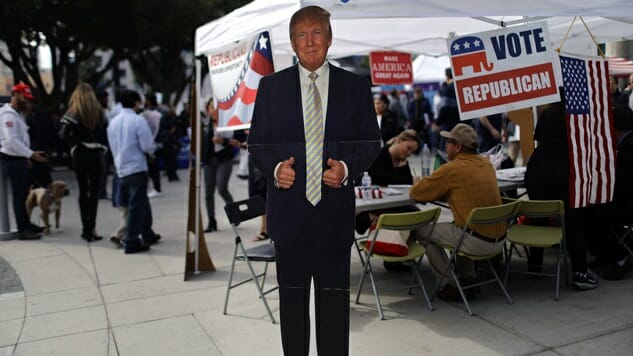New Study Finds Trump Voters Motivated by Fear of Losing Status, Rather Than Economic Anxiety
Photo by Mario Tama/Getty Politics News Trump Voters
A common motivation attributed to the rise and cultivation of President Trump’s voter base over the last three years has been that of economic anxiety, citing unemployment concerns and the under-service of impoverished communities. A new study released in the Proceedings of the National Academy of Sciences on Monday bucks this belief, stating that the influx of white, Christian male voters that swung Trump’s way was fueled more so by a perceived fear that their cultural status was at risk.
““It’s much more of a symbolic threat that people feel … It’s not a threat to their own economic well-being; it’s a threat to their group’s dominance in our country over all,” the study’s author, Diana Mutz told the New York Times.
Mutz, who heads the Institute for the Study of Citizens and Politics at the University of Pennsylvania, studied survey data of 1,200 voters from 2012 and 2016 in an effort to find evidence supporting the “economic anxiety” argument and decipher whether the fear of losing social dominance influenced voters to support Trump. Her argument against the commonly held belief focuses on the fact that the economy was already improving before Trump took office, as well as on the lack of evidence that personal financial standing actually influences voters’ decisions come election season.
Her findings found a correlation between rising fears of globalization and Trump’s critical stance on trade, fueled by the perceived economic threat posed by China. These fears that U.S. global dominance was at risk greatly benefited the Trump campaign and the Republican party as a whole. The trend was present domestically, as well, with Trump support being linked to belief in “social dominance orientation” and the belief that high-status groups, such as white, Christian males, faced more discrimination that low-status groups, such as minorities or women. “It used to be a pretty good deal to be a white, Christian male in America, but things have changed and I think they do feel threatened,” Mutz said.
Mutz’s study isn’t the first to make such a connection, but the findings remain important in today’s political climate as the economic growth touted by the Trump administration could be heralded as a victory to his base if the “economic anxiety” argument continues to persist.